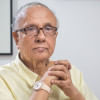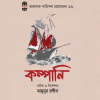Ganga Jamuna cultural festival kicks off with splendour and zeal

One of the country's largest cultural initiatives, the Ganga-Jamuna Theatre and Cultural Festival, commenced with grandeur at the Bangladesh Shilpakala Academy (BSA) on Friday.
The 12-day-long event will host approximately 4,000 artistes and 145 different theatre troupes from Bangladesh and India, presenting a variety of plays, recitals, singing, and dance performances. Amongst them, around 80 solo artistes will also grace the programme.
The performances will be showcased at Bangladesh Shilpakala Academy's Studio Theatre Hall, National Theatre Hall, and Experimental Theatre Hall, as well as at Bangladesh Mohila Samity's Nilima Ibrahim Auditorium.

On the first day of the festival, the audience witnessed the eminent Bangladeshi playwright and thespian Abdullah Al Mamun's directorial "Meraj Fakirer Maa" at BSA's National Theatre Hall, the popular theatre troupe Batighar's "Bhagaban Paliye Gechhe" at the Experimental Theatre Hall, and Kisharganj's Ekota Natyagasthi's "1971" at Studio Theatre Hall, all happening simultaneously.
Following theatre performances will be staged daily from 6 pm until October 17 at the aforementioned theatre halls. Additionally, performances will take place at the Unmukta Mancha in the National Theatre Hall premises every day until 4 pm.
Eminent thespian, director, and cultural personality Ramendu Majumdar inaugurated the opening ceremony at 6 pm at the auditorium of the National Theatre Hall. The programme was presided over by the convener of Ganga Jamuna Shangskritik Parshad, Ghulam Kuddus, while the Minister of Cultural Affairs, K M Khalid, MP, graced the occasion as the Chief Guest.
The welcome speech for the event was delivered by BSA Director-General Liaquat Ali Lucky. "Our diversity and cultural identity are our biggest strengths, and spreading that idea is the main objective of arranging this festival every year," he said while addressing a hall full of audiences.

"This is a crucial time to reinstate and celebrate our cultural heritage with grandeur as we have become more vulnerable, attacked by religious extremist groups. While we are being praised and acknowledged by foreign countries for the sacrifices we made for our language, we are becoming more cornered by extremists who are spreading misinformation and impeding our rural cultural practices," BSA DG added.
Noted thespian, director, and playwright Mamunur Rashid said in his address, "We are a country built on the foundation of cultural diversity and harmony, and the Ganga Jamuna Festival is another testament to a friendship beyond borders." He requested the audiences and cultural activists to not only celebrate or witness the performances and acts but to make it a practice, as the idea is somewhat lost in our cultural scene right now.
"Unless we make art and culture a divine practice and a way of living, we will lose our cultural identity as a nation and, along with it, our biggest assets — rural artists," the celebrated thespian concluded.
Echoing Mamunur Rashid's remarks, former Cultural Minister and eminent thespian Asaduzzaman Noor said, "Our rural areas used to be colorful and festive with Jatrapala, Jari gaan, Kobi gaan, and Pala gaan, but cultural personalities there are getting attacked and harassed."
"These religious extremism-borne atrocities cannot only be mitigated by government intervention, but each of us has to stand up strongly against these cunning movements, which are targeted to ruin our cultural practices," the eminent artiste concluded.

State Minister for Cultural Affairs K M Khalid said, "The Ministry of Cultural Affairs has always been the biggest advocate of preserving Bengali cultural heritage and is still working to improve it. However, no matter how much we try, unique festivals such as Nabanna Utsav, Jatrapala, Jari Gaan, Pala Gaan, Nabanno Mela, etc., are disappearing from our rural culture."
"We need the active collaboration of all cultural associations to arrange this type of festival all throughout Bangladesh to revive our heritage, and the ministry will provide deliberate assistance in execution, with utmost importance," the minister said.
Eminent thespian, director, and cultural personality Ramendu Majumdar said, "As a nation, our cultural identity has always been threatened by fundamentalists, but we have always fought it back with harmony, peace, and our cultural practices themselves."
"However, we need to involve the younger generation in cultural activities to protect and promote our heritage, so that it does not die with us. We need to listen to them for what they need, and we are commencing this festival with this hope and objective," he said.
This year, the audience will witness popular theatrical acts, including Nagorik Natya Sampradaya's "Ontore Bahire Chitrangada", Batighor's "Bhogoban Paliye Gechhe", "Odhora Madhuri" (India) by theatre troupe Ajker Projonmo, and "Bhalobasha" (India) by theatre troupe Onik, amongst others.
The open-for-all theatre festival will run until October 17.

 For all latest news, follow The Daily Star's Google News channel.
For all latest news, follow The Daily Star's Google News channel. 









Comments